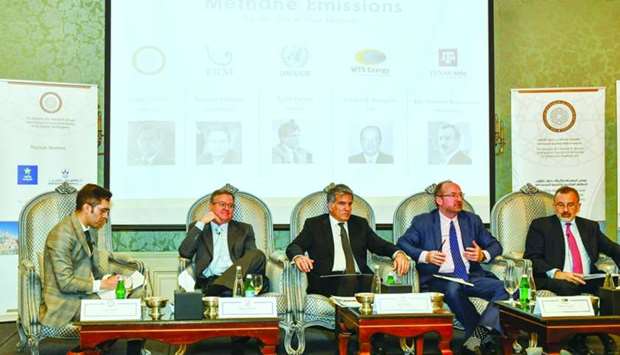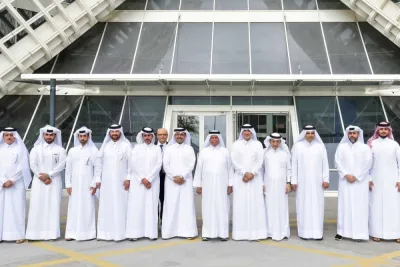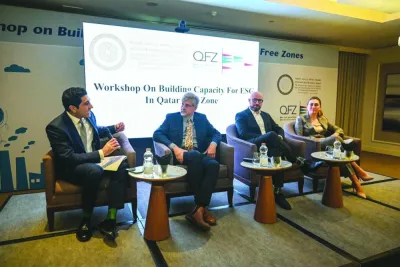The State of Qatar, which is among the world’s top exporters of liquefied natural gas (LNG), remains at the forefront of efforts to minimise methane emissions, according to an official of the Abdullah Bin Hamad Al-Attiyah International Foundation for Energy & Sustainable Development.
Howard Bevan, the director of Energy Affairs at the Al-Attiyah Foundation, said natural gas is considered to be the cleanest burning fossil fuel.
However, for gas to remain competitive, the gas industry must make a concerted effort to reduce methane emissions. Qatar, as a leading exporter of gas, is taking great steps to achieve this, he said.
“At the Al-Attiyah Foundation, we provide platforms such as this dialogue today, so the industry can share knowledge and experience, as the world transitions to a sustainable energy future,” Bevan told Gulf Times on the sidelines of the foundation’s quarterly ‘CEO Round-Table and Senior Energy Managers Dialogue’ held on Wednesday in Doha.
The event, which carried the theme ‘Reducing Methane Emissions from Energy-Related Extractive Activities’, witnessed discussions led by experts, such as Scott Foster, director, Sustainability Energy Division, United Nations Economic Commission for Europe (UNECE); Braulio Pikman, expert advisor, Environmental Resources Management (ERM); Dr Ioannis Economou, associate dean for Academic Affairs and Professor of Chemical Engineering at Texas A&M University; and Frederik Rengers, chief executive officer, WTS Energy Netherlands B V, and chairman of the Board The Sniffers.
The Al-Attiyah Foundation said burning natural gas produces less greenhouse gas emissions (GHG) than burning coal and crude oil.
“For this reason, natural gas is considered the cleanest fossil fuel…although short-lived in the atmosphere, methane contributes more than 10% to the overall anthropogenic emissions thus reducing methane emissions is considered one of the low-hanging fruits of climate change mitigation,” it said.
According to the foundation, the main sources of anthropogenic methane emissions are the oil and gas industry, agriculture, landfills, wastewater treatment, and emissions from coal mines, with the oil and gas sector generally considered the largest emitter of methane after agriculture.
The foundation noted that reducing methane emissions from energy-related extractive activities could be “a win-win solution” for delivering on the global promises to tackle climate change.
“However, despite readily available technology, there is still a relatively low global effort in the monitoring, reporting, and abating of methane emissions. The situation is changing, with several initiatives now being undertaken by the industry and multi-stakeholder groups,” Al-Attiyah Foundation said.
In 2017, a group of eight companies signed a set of ‘Guiding Principles on Reducing Methane Emissions across the Natural Gas Value Chain’ including the Al-Attiyah Foundation’s member, Qatar Petroleum, and partners ExxonMobil and Shell.
In a presentation during the lecture, Environmental Resources Management expert adviser Braulio Pikman said natural gas “is the best opportunity for a transition to a low carbon economy, but however stressed that methane emissions “are very impactful because of its warming potential.”
He also emphasised that the oil and gas sector “concentrates the best opportunities to reduce methane emissions,” and that “only flaring avoidance may deliver approximately 350mn tonnes CO2e reduction or more.”
However, for gas to remain competitive, the gas industry must make a concerted effort to reduce methane emissions. Qatar, as a leading exporter of gas, is taking great steps to achieve this, he said.
“At the Al-Attiyah Foundation, we provide platforms such as this dialogue today, so the industry can share knowledge and experience, as the world transitions to a sustainable energy future,” Bevan told Gulf Times on the sidelines of the foundation’s quarterly ‘CEO Round-Table and Senior Energy Managers Dialogue’ held on Wednesday in Doha.
The event, which carried the theme ‘Reducing Methane Emissions from Energy-Related Extractive Activities’, witnessed discussions led by experts, such as Scott Foster, director, Sustainability Energy Division, United Nations Economic Commission for Europe (UNECE); Braulio Pikman, expert advisor, Environmental Resources Management (ERM); Dr Ioannis Economou, associate dean for Academic Affairs and Professor of Chemical Engineering at Texas A&M University; and Frederik Rengers, chief executive officer, WTS Energy Netherlands B V, and chairman of the Board The Sniffers.
The Al-Attiyah Foundation said burning natural gas produces less greenhouse gas emissions (GHG) than burning coal and crude oil.
“For this reason, natural gas is considered the cleanest fossil fuel…although short-lived in the atmosphere, methane contributes more than 10% to the overall anthropogenic emissions thus reducing methane emissions is considered one of the low-hanging fruits of climate change mitigation,” it said.
According to the foundation, the main sources of anthropogenic methane emissions are the oil and gas industry, agriculture, landfills, wastewater treatment, and emissions from coal mines, with the oil and gas sector generally considered the largest emitter of methane after agriculture.
The foundation noted that reducing methane emissions from energy-related extractive activities could be “a win-win solution” for delivering on the global promises to tackle climate change.
“However, despite readily available technology, there is still a relatively low global effort in the monitoring, reporting, and abating of methane emissions. The situation is changing, with several initiatives now being undertaken by the industry and multi-stakeholder groups,” Al-Attiyah Foundation said.
In 2017, a group of eight companies signed a set of ‘Guiding Principles on Reducing Methane Emissions across the Natural Gas Value Chain’ including the Al-Attiyah Foundation’s member, Qatar Petroleum, and partners ExxonMobil and Shell.
In a presentation during the lecture, Environmental Resources Management expert adviser Braulio Pikman said natural gas “is the best opportunity for a transition to a low carbon economy, but however stressed that methane emissions “are very impactful because of its warming potential.”
He also emphasised that the oil and gas sector “concentrates the best opportunities to reduce methane emissions,” and that “only flaring avoidance may deliver approximately 350mn tonnes CO2e reduction or more.”




